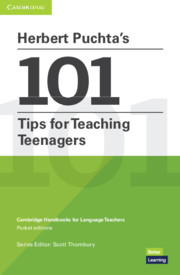 Herbert Puchta's 101 Tips for Teaching Teenagers
Herbert Puchta's 101 Tips for Teaching Teenagers Published online by Cambridge University Press: 28 October 2023
Reading requires effort and passion, and to some teenagers it may not seem like something they want to work at. After all, there is a world of electronic temptations out there that require far less effort and feel as though they are going to be a lot more entertaining. Yet many teens are concerned about their future, and how successful they will be in tomorrow's world. So this section provides a range of ideas: some that support less motivated readers; some that give a fascinating insight into what happens in the brain when we read and some that provide clear guidelines to help develop the reading skills needed for passing exams.
60 Create awareness of what's happening while reading
61 Vary the lead-in activities you use
62 Use motivating tasks in connection with extensive reading
63 Help learners become fluent readers
64 Use interactive reading ideas
65 Occasionally, ask learners to read while listening
66 Regularly revisit texts learners have read
67 Explore a story using all the senses
68 Scaffold learners’ intensive reading (1)
69 Scaffold learners’ intensive reading (2)
70 Scaffold learners’ inferencing skills with the help of poetry
71 Engage learners in creating concept maps
72 Read texts out loud
60 Create awareness of what's happening while reading
Helping learners become aware of what's happening inside their heads when they read can improve their reading, and increase their enjoyment of it.
When we read a novel, for example, we constantly want to find out what happens next. A little experiment helps learners explore what's going on in their minds when they read:
• Select a very short story, preferably ending in a single sentence containing a twist or a surprise. Tell learners that you are going to present a text to them in a very unusual way: sentence by sentence, with a pause of about 10 seconds after each sentence.
• Ask learners to remain silent during each pause in order to write down what they expect will come next.
• Carry on until you get to the pause just before the last sentence (which you’re not going to tell them – yet).
• Tell learners to discuss these questions in pairs or small groups: At each pause, what did you expect to happen next? And what are your expectations for the ending of the story?
To save this book to your Kindle, first ensure [email protected] is added to your Approved Personal Document E-mail List under your Personal Document Settings on the Manage Your Content and Devices page of your Amazon account. Then enter the ‘name’ part of your Kindle email address below. Find out more about saving to your Kindle.
Note you can select to save to either the @free.kindle.com or @kindle.com variations. ‘@free.kindle.com’ emails are free but can only be saved to your device when it is connected to wi-fi. ‘@kindle.com’ emails can be delivered even when you are not connected to wi-fi, but note that service fees apply.
Find out more about the Kindle Personal Document Service.
To save content items to your account, please confirm that you agree to abide by our usage policies. If this is the first time you use this feature, you will be asked to authorise Cambridge Core to connect with your account. Find out more about saving content to Dropbox.
To save content items to your account, please confirm that you agree to abide by our usage policies. If this is the first time you use this feature, you will be asked to authorise Cambridge Core to connect with your account. Find out more about saving content to Google Drive.